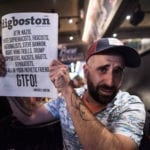
I recently reached out to Boston Music Award-nominated reggae singer Greg Roy on account of having one of his songs, “Take a Sip,” stuck in my head, on repeat, for more than a week. The link had come in from his manager, and for the following several days it became my background, if not my barbound theme music.
Take a sip / Take another sip up out the chalice
Having covered reggae in the Hub for more than a decade, I’m always interested in what’s new, how up-and-coming artists interact with the larger music scene, and where it is all headed. Even if a lot of people aren’t hip to it, there’s always something relatively major popping—from icons such as Sizzla touching down in Dorchester to hometown hero Mighty Mystic, one of the most successful Hub-related reggae artists to date, dropping new music.
As it turned out, I knew about Greg Roy and didn’t realize it before I contacted his team. I actually saw him live, performing covers by Bob Marley and others for hours upon glorious hours last year. It’s an experience to behold, and so with the Greg Roy Music Experience popping every Sunday at Fenway Johnnie’s, plus a new album about to drop with loads of fresh original roots music, I floated a couple of questions to the Montego Bay-born musician-producer-engineer.
When did you start cutting records?
I cut my first one at 15.
What’s the industry like down in Jamaica?
It was mostly me and my brothers doing it by ourselves. There are also the big labels down there, but at that time, reggae wasn’t on the rise.
What kinds of reggae have you performed and recorded through the years?
I’ve been across the spectrum since the beginning—as a writer, then as a sound engineer, and a disc jockey. I was rapping for a minute in there, then I started doing hardcore dancehall when I was like 19. But before that, me and my brothers would all be singing Boyz II Men songs, things like that. It’s a wide range. As a producer, I spend a lot of my time around the elder reggae artists, and rubbing shoulders with them rubbed off.
What’s your experience behind the boards?
I spent 15 years as a studio engineer, a live sound engineer, and a record producer.
What’s the secret to live studio engineering for reggae in particular?
Feeling. Everyone is there. It’s like gathering everyone around a campfire with a drum. When the feeling gets right, then you hit that button.
How and when did you come to the Boston area?
I come up as often as I possibly can and am basically living in Boston now. That started four years ago. Five years ago I came to Boston and did some work in the studio with a friend of mine called Castafari.
What were your impressions of the scene at the time?
I didn’t see much of it. I was mostly in the studio, producing and recording. I made my first album here in Boston.
How much were you aware of the history of reggae in Boston at the time?
Nothing. I was between here and New York, and was doing a radio show in New York on Linkage Radio. And so I would come to Boston to do music, and go back there to do radio. And then I met a poet by the name of Paul who brought me into Somerville. There I met with Jeff Robinson of the [Bob Marley cover band the Duppy Conquerors], and I became a member of that band, singing with them for two years. So far, my community has been around the right people, people who want to see reggae music grow. But to say I’m a part of the scene, I’d say not yet. I’m still paying dues.
 What’s your approach when doing covers of songs by the greats like Bob Marley?
What’s your approach when doing covers of songs by the greats like Bob Marley?
Bob Marley is an influence—mine and probably every reggae artist who came after him.
Who else has really moved you over the years?
Alton Ellis. He was a real singer in Jamaica. A lot of these singers right now have that sound. You can find that sound in them. Beres Hammond is another one who has been a really great and powerful influence. And Buju Banton, the way he commands a stage. And it goes on—Peter Tosh, for a long time I was caught in his magic, and studying his life. Gregory Isaacs is another one—I’m named after him. My father’s argument was that Gregory Isaacs was the real deal.
What makes you stick out? What’s your trademark?
I believe that love breaks any barrier, and so I approach every situation with love. I believe the spreading of this virus called love is most important right now, and so that’s where I am building, for transference of that kind of energy and trying to help families in particular. Somehow we are going to cycle out of all this madness.
What’s gig life like for a reggae artist out of Boston these days? Are you traveling a lot?
When I’m traveling, it’s mostly for private parties. I do a lot of those things. I also just finished a small series and tour for the summer covering a wide range of venues across Massachusetts and up into New Hampshire.
Right now I think it’s all right.
For info on shows and new music, visit gregroymusic.com.
A Queens, NY native who came to New England in 2004 to earn his MA in journalism at Boston University, Chris Faraone is the editor and co-publisher of DigBoston and a co-founder of the Boston Institute for Nonprofit Journalism. He has published several books including 99 Nights with the 99 Percent, and has written liner notes for hip-hop gods including Cypress Hill, Pete Rock, Nas, and various members of the Wu-Tang Clan.

